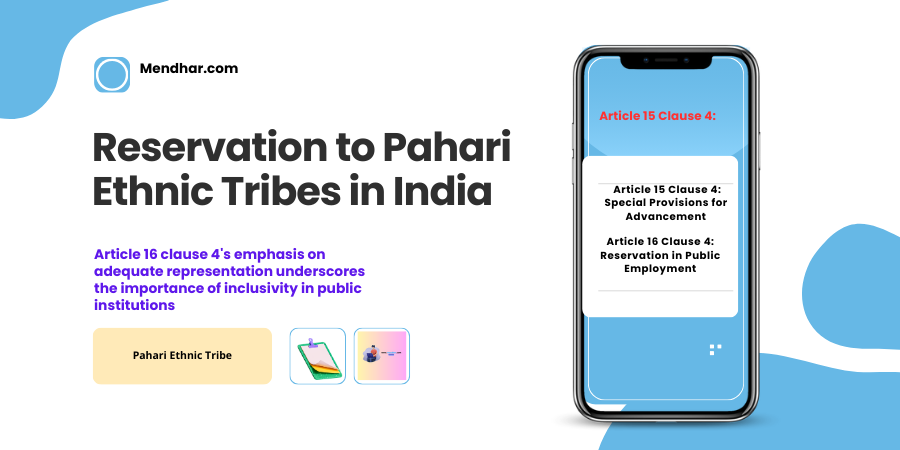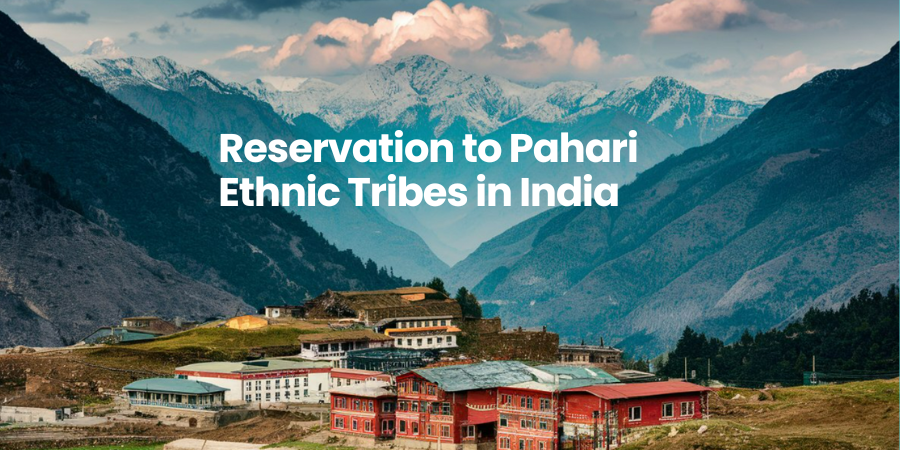Table of Contents
ToggleReservation to Pahari Ethnic Tribes in India: An In-Depth Analysis

Introduction:
In the recent amendments to India’s reservation policies, the inclusion of Pahari ethnic tribes in the Scheduled Tribes (ST) category marks a significant development. This decision, based on constitutional provisions such as Article 15 clause 4, Article 16 clause 4, Article 330, and Article 332, aims to address the historical disadvantages faced by these communities. Understanding these articles and clauses is crucial for comprehending the legal framework that supports such affirmative actions. This blog explores the reservation to Pahari ethnic tribes, examining the relevant constitutional provisions and their implications.
Article 15 Clause 4: Special Provisions for Advancement
Article 15 of the Indian Constitution prohibits discrimination on grounds of religion, race, caste, sex, or place of birth. However, Article 15 clause 4 empowers the State to make special provisions for the advancement of any socially and educationally backward classes of citizens or for the Scheduled Castes (SC) and Scheduled Tribes (ST). This clause was added by the First Amendment Act of 1951, which was a response to the challenges of implementing a uniform policy of social justice across diverse groups in India.
The inclusion of Pahari ethnic tribes in the ST category under Article 15 clause 4 allows the government to create policies that specifically target the upliftment of these communities. This can include educational scholarships, reservation in educational institutions, and other benefits that can help bridge the socio-economic gap. The significance of Article 15 clause 4 lies in its ability to provide a constitutional basis for positive discrimination, ensuring that historically marginalized groups receive the support needed to achieve parity with the rest of society.
By invoking Article 15 clause 4, the government acknowledges the unique challenges faced by Pahari ethnic tribes, such as limited access to education, healthcare, and employment opportunities. This recognition is crucial for the formulation of targeted policies that can effectively address these issues. Furthermore, it sets a legal precedent for the inclusion of other similarly disadvantaged groups, reinforcing the commitment to social justice and equality as envisioned by the Constitution.

Article 16 Clause 4: Reservation in Public Employment:
Article 16 guarantees equality of opportunity in matters of public employment. However, Article 16 clause 4 allows the State to make provisions for the reservation of appointments or posts in favor of any backward class of citizens that, in the opinion of the State, is not adequately represented in the services under the State. This clause serves as a crucial tool for ensuring representation of marginalized communities in government jobs.
The reservation to Pahari ethnic tribes under Article 16 clause 4 aims to enhance their participation in public employment. Historically, these tribes have been underrepresented in government jobs due to socio-economic barriers. By granting them reservation, the government ensures that Pahari ethnic tribes have a fair chance at securing employment in the public sector, which is a significant step towards economic empowerment.
Article 16 clause 4’s emphasis on adequate representation underscores the importance of inclusivity in public institutions. It recognizes that mere equality in opportunity is insufficient for achieving substantive equality, especially for communities that have faced systemic discrimination and exclusion. The reservation policy for Pahari ethnic tribes is a practical manifestation of this principle, aimed at creating a level playing field in public employment.
The impact of such reservation extends beyond individual beneficiaries to the community as a whole. It fosters a sense of inclusion and belonging among Pahari ethnic tribes, promoting their integration into the mainstream workforce. Additionally, representation in public employment can serve as a source of inspiration and motivation for future generations, encouraging them to pursue education and career aspirations. Thus, Article 16 clause 4 plays a vital role in facilitating social mobility and economic development for Pahari ethnic tribes.

Article 330 and 332: Reservation in Legislative Bodies
Articles 330 and 332 of the Indian Constitution pertain to the reservation of seats for Scheduled Castes and Scheduled Tribes in the Lok Sabha (House of the People) and State Legislative Assemblies, respectively. Article 330 mandates the reservation of seats for SCs and STs in the Lok Sabha based on the proportion of their population to the total population in the State or Union Territory. Similarly, Article 332 provides for the reservation of seats in the Legislative Assemblies of States.
The inclusion of Pahari ethnic tribes in the ST category under these articles ensures their political representation. This is crucial for addressing their specific needs and concerns within the legislative framework. Political representation enables Pahari ethnic tribes to have a voice in the decision-making process, influencing policies that directly affect their lives and communities.
The reservation of seats in legislative bodies helps in fostering political empowerment among Pahari ethnic tribes. Historically marginalized groups often face challenges in accessing political power due to socio-economic constraints and systemic discrimination. By securing reserved seats, these communities can participate more actively in governance and policy-making, ensuring that their interests are adequately represented.
Moreover, political representation under Articles 330 and 332 can lead to more inclusive and equitable development policies. Legislators from Pahari ethnic tribes are likely to prioritize issues such as education, healthcare, and infrastructure development in their regions, addressing long-standing disparities. This can result in more targeted and effective use of resources, promoting overall socio-economic development.
Conclusion:-
The reservation to Pahari ethnic tribes, supported by constitutional provisions such as Article 15 clause 4, Article 16 clause 4, Article 330, and Article 332, represents a significant step towards achieving social justice and equality in India. These articles provide a robust legal framework for affirmative action, ensuring that historically marginalized communities receive the support and opportunities necessary to overcome socio-economic disadvantages.
By granting reservations in education, public employment, and legislative bodies, the government acknowledges the unique challenges faced by Pahari ethnic tribes and takes concrete steps to address them. This not only promotes the socio-economic upliftment of these communities but also fosters a more inclusive and equitable society.
The implementation of these reservations is a testament to the Indian Constitution’s commitment to social justice and equality. It underscores the importance of targeted policies in addressing historical injustices and creating a level playing field for all citizens. As India continues to strive towards a more inclusive and equitable future, the reservation to Pahari ethnic tribes serves as a crucial milestone in this ongoing journey


